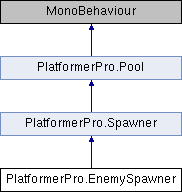|
Platformer Pro
2.3.2
A platform game kit for Unity.
|
|
Platformer Pro
2.3.2
A platform game kit for Unity.
|

Public Attributes | |
| int | maxAlive |
| How many enemies can be alive at any one time. More... | |
 Public Attributes inherited from PlatformerPro.Spawner Public Attributes inherited from PlatformerPro.Spawner | |
| bool | autoSpawn = true |
| If true we spawn automatically. If false we wait until something calls us. More... | |
| int | spawnAmount |
| How many objects to spawn, use -1 for infinite. More... | |
| float | spawnRate |
| How fast should we spawn. More... | |
| bool | delayOnFirstInstance |
| If true the first instance will be delayed by the spawn rate, else it will spawn instantly. More... | |
 Public Attributes inherited from PlatformerPro.Pool Public Attributes inherited from PlatformerPro.Pool | |
| List< GameObject > | pooledObjects |
| The pooled objects. You can assign the pool here, this can be useful if you don't want all objects to be the same. More... | |
| GameObject | poolPrefab |
| Prefab to use to create new pool objects. More... | |
| int | startingSize |
| Starting size of pool. More... | |
| bool | createMoreIfExhausted |
| Should we create more objects if pool is exhausted or should we throw an error. More... | |
Protected Member Functions | |
| override void | Init () |
| Initialise pool. More... | |
| override void | Reset (GameObject instance) |
| Reset the specified instance. Specific implementations should override this. More... | |
| override IEnumerator | Spawn () |
| Coroutine that spawns enemies. More... | |
| virtual bool | CheckAliveCount () |
| Check we don't have too many enemies alive and thus can't spawn. More... | |
 Protected Member Functions inherited from PlatformerPro.Spawner Protected Member Functions inherited from PlatformerPro.Spawner | |
| override void | Init () |
| Initialise pool. More... | |
| virtual void | DoSpawn () |
| Do the spawning. More... | |
 Protected Member Functions inherited from PlatformerPro.Pool Protected Member Functions inherited from PlatformerPro.Pool | |
| virtual void | PopulatePool () |
| Initialise the pool. More... | |
| virtual GameObject | CreateInstance () |
| Creates a new instance. More... | |
Protected Attributes | |
| int | defaultHealth |
| The default health to restore when resetting More... | |
| bool | defaultCanCharacterFall |
| The default can cahracter fall setting to restore. here because often death movements change this. More... | |
 Protected Attributes inherited from PlatformerPro.Spawner Protected Attributes inherited from PlatformerPro.Spawner | |
| int | spawnsRemaining |
| How many spwns remain. More... | |
 Protected Attributes inherited from PlatformerPro.Pool Protected Attributes inherited from PlatformerPro.Pool | |
| int | currentPosition |
| Current position in pool. More... | |
Additional Inherited Members | |
 Public Member Functions inherited from PlatformerPro.Spawner Public Member Functions inherited from PlatformerPro.Spawner | |
| virtual void | SpawnNow () |
| If this is not an auto spawner start spawning. More... | |
 Public Member Functions inherited from PlatformerPro.Pool Public Member Functions inherited from PlatformerPro.Pool | |
| void | Start () |
| Unity Start hook. More... | |
| virtual GameObject | GetInstance () |
| Gets an instance form the pool, or null if no instances available. More... | |
|
protectedvirtual |
Check we don't have too many enemies alive and thus can't spawn.
true, if alive count was checked, false otherwise.
|
protectedvirtual |
Initialise pool.
Reimplemented from PlatformerPro.Pool.
|
protectedvirtual |
Reset the specified instance. Specific implementations should override this.
| instance | Instance. |
Reimplemented from PlatformerPro.Pool.
|
protectedvirtual |
Coroutine that spawns enemies.
Reimplemented from PlatformerPro.Spawner.
|
protected |
The default can cahracter fall setting to restore. here because often death movements change this.
|
protected |
The default health to restore when resetting
| int PlatformerPro.EnemySpawner.maxAlive |
How many enemies can be alive at any one time.